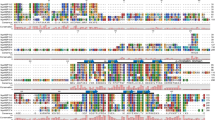Abstract
The heat shock protein HtpG is homologous to members of the Hsp90 protein family of eukaryotes and is essential for basal and acquired thermotolerances in cyanobacteria. In this study we have examined the role of HtpG in the cyanobacterium, Synechococcus sp. PCC 7942, in the acclimation to low temperatures. The inactivation of the htpG gene resulted in severe inhibition of cell growth and of the photosynthetic activity when the htpG mutant was shifted to 16°C from 30°C. Wild-type cells were able to resume growth without a lag period when shifted to 30°C after 5 days at 16°C, while the mutant displayed a detectable lag. The HtpG protein was induced in the wild-type cells at 16°C. Electrophoresis in the absence of sodium dodecyl sulfate (SDS) showed that a novel, high-molecular-weight complex containing GroEL and DnaK accumulated at 16°C, but the accumulation was strongly inhibited in the htpG mutant. Our results demonstrate that the HtpG protein contributes significantly to the ability of cyanobacteria to acclimate to low temperatures.
Similar content being viewed by others
Author information
Authors and Affiliations
Additional information
Received: 16 July 2001/Accepted: 15 August 2001
Rights and permissions
About this article
Cite this article
Hossain, M., Nakamoto, H. HtpG Plays a Role in Cold Acclimation in Cyanobacteria. Curr Microbiol 44, 291–296 (2002). https://doi.org/10.1007/s00284-001-0005-9
Issue Date:
DOI: https://doi.org/10.1007/s00284-001-0005-9




